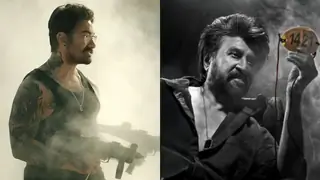Ustad Sultan Khan & Friends - Suhel Khan<>document.write('Aelina,')</>Aelina, IndiaGlitz May 08, 2007 |
| When an album goes by the name of 'Ustad Sultan Khan & Friends', one expects an album that would feature the singer along with some other established and newcomer singers sharing a song or two with the legend. What one understands on checking out the album is that fact this is mainly a launch pad of singer/composer Suhel Khan who has recently being making waves for his hit number 'In Dino' from the film LIFE IN A...METRO that is blazing all over the town. While the album has music by Suhel who also sings each of the 10 tracks in the film, Ustad Sultan Khan is mainly heard in 2 tracks with other singers coming with a song apiece for the remaining tracks. Lyrics are written by Jameel Mujahid except for 3 tracks. It's a semi-classical setting for 'Yaad Piya Ki Aayi' that is a lovely duet between Ustad Sultan Khan and Sadhna Sargam. 'Sitar' is the instrument that makes is present most in this track that is enjoyed most in isolation. Completely based on Indian music, melody and rhythm with no Western influences, it is a soulful hear that also has Suhel Khan making his presence felt as he appears once Ustad Sultan Khan has set the ground for him. 'Lounge Mix' version of the track appears at the end of the album and has both Suhel Khan and Ustad Sultan Khan sharing the same platform to come together at the very beginning. With minimal instruments at the background and Sadhna Sargam coming at just the right moments in the song, this one turns out to be even better version that the original. Shreya Ghoshal replaces Sadhna Sargam in 'Jhanki Laagi Chhaon Ki' that has a North Indian folk feel to it. A track which is reminiscent of the kind of music that was heard in Rajshri films from the late 70s/early 80s [remember NADIYA KE PAAR?], it is pure, unadulterated and based completely on Indian music and instruments. Even singing by the lead singers, Ustad Sultan Khan, Suhel Khan and Shreya Ghoshal, is unadulterated here that just doesn't leave any scope for interruptions of any kind as the three render this track with their heart in. In 'Maula', Suhel Khan is the only male lead as he is surrounded by Sadhna Sargam and Shreya Ghoshal. A 'qawalli' in appreciation of thw almighty, 'Maula' is rhythmic and instantly catchy. What impresses most is the presence of the female singers in the song who bring a certain fizz to the proceedings that make it better sounding than the routine tracks belonging to this genre. The same team comes together for 'Maahi' where Suhel Khan shares the stage with Sadhna Sargam and Shreya Ghoshal. A tune that would be recognized for its simplisitic approach with a laidback tune taking the song forward, it is again immersed in the feel of 70s and 80s though one is shocked to an extent as Suhel suddenly decides to render a few words in English. Just not required! Bhupinder Singh and Mitali Singh lend support for 'Jaane Kyon' from which one expects a bona fide ghazal to be making an appearance next. Thankfully the listener gets what he/she was looking for as the two veterans prove their worth once again with a track that relies most on melody and boasts of some meaningful lyrics. Suhel Khan, as in all the tracks of the album, makes an appearance too and justifies his presence. First solo of the album comes in the form of 'Usne Hamein Phir Yaad Kiya Hai' that is the only solo track by Suhel Khan with music by Ustad Rais Khan. Written by Muztar Indori, the song is yet another 'ghazal' in the track that would be known for the kind of depth Suhel brings in his vocals. If one recognized his boyish charm in 'In Dino' [Metro], it would be worth your time to hear him croon a 'ghazal' in an altogether different manner. Zudin Garg, who hasn't rested ever since he was heard in 'Ya Ali' [Gangster], is heard a little late in the album when 'Chaand Taare' arrives. After a 'ghazal', it is time to hear a 'qawalli', this time with both Zubin and Suhel in tow and what follows from thereon is a track that could as well have been set in the 60s/70s. From the basic tune to the overall composition, 'Chaand Taare' is vintage 'qawalli', though not of a kind that would make you put it on in a repeat mode. Nevertheless things soon turn better with 70s style 'O Re Piya' where Suhel Khan gets into a duet with Sadhna Sargam. Reminding of the songs that used to appear in one of the middle-of-the-road films by Hrishikesh Mukherjee and Basu Chatterjee, 'O Re Piya' is an immensely likeable numbers that can be heard over and over again by those who want their music to have a sprinkling of a light dose of Indian classical music. For the first time in the album, Suhel Khan is seen in an all-around role as he sings, writes and composes 'Dhaani Chunariya'. Yet again, the song is immersed in Indian classical mode and with instruments too complimenting the same feel, one knows what to expect from rest of the track. In spite of belonging to today's generation, Suhel goes back in time to dig out the melody of the past and does manage to do a good job while doing so. Last track of the album is quite heavy when it comes to singing since for the first time ever there are as many as 6 singers coming together to croon 'Pyar Hai'. Ustad Rais Khan, Farhan Khan, Husnain Khan, Tarannum Bakshi, Bilquess Khanum and Suhel Khan come together for a song that turns out to be one of the best numbers in the album and stands out due to its easy-to-ears tune. A number in appreciation of love and how it drives an entire world, 'Pyar Hai' is written by Rameez with music by Ustad Rais Khan. More than turning out to be a showcase for Suhel Khan, the singer, the album would be remembered for the pure tunes that Suhel Khan, the composer, has brought in. In the days when what one hears is pop, rock and some lounge, Suhel Khan brings back Indian classical music into the melodies that are charming and quite easy on ears. |























